Successful Ageing: Exploring Psychological and Psychosocial Influences
VerifiedAdded on 2023/01/06
|7
|2047
|48
Essay
AI Summary
This essay delves into the multifaceted concept of successful ageing, examining the crucial roles of both psychological and psychosocial factors. It begins by defining successful ageing as encompassing high physical, psychological, and social functioning in later life, emphasizing the absence of major health complications and active engagement. The essay then explores various psychological factors like financial stability, cognitive function, and stress management, highlighting their impact on mental health and quality of life. It also investigates psychosocial factors such as marital happiness, social support, and participation in leisure activities, and their influence on overall well-being. Furthermore, the essay analyzes the intricate relationships between these factors and health outcomes, illustrating how psychological and psychosocial elements contribute to or detract from a healthy and fulfilling life course. The conclusion reinforces the importance of these factors in promoting successful ageing and overall well-being.

We can all Age
Successfully
Successfully
Paraphrase This Document
Need a fresh take? Get an instant paraphrase of this document with our AI Paraphraser
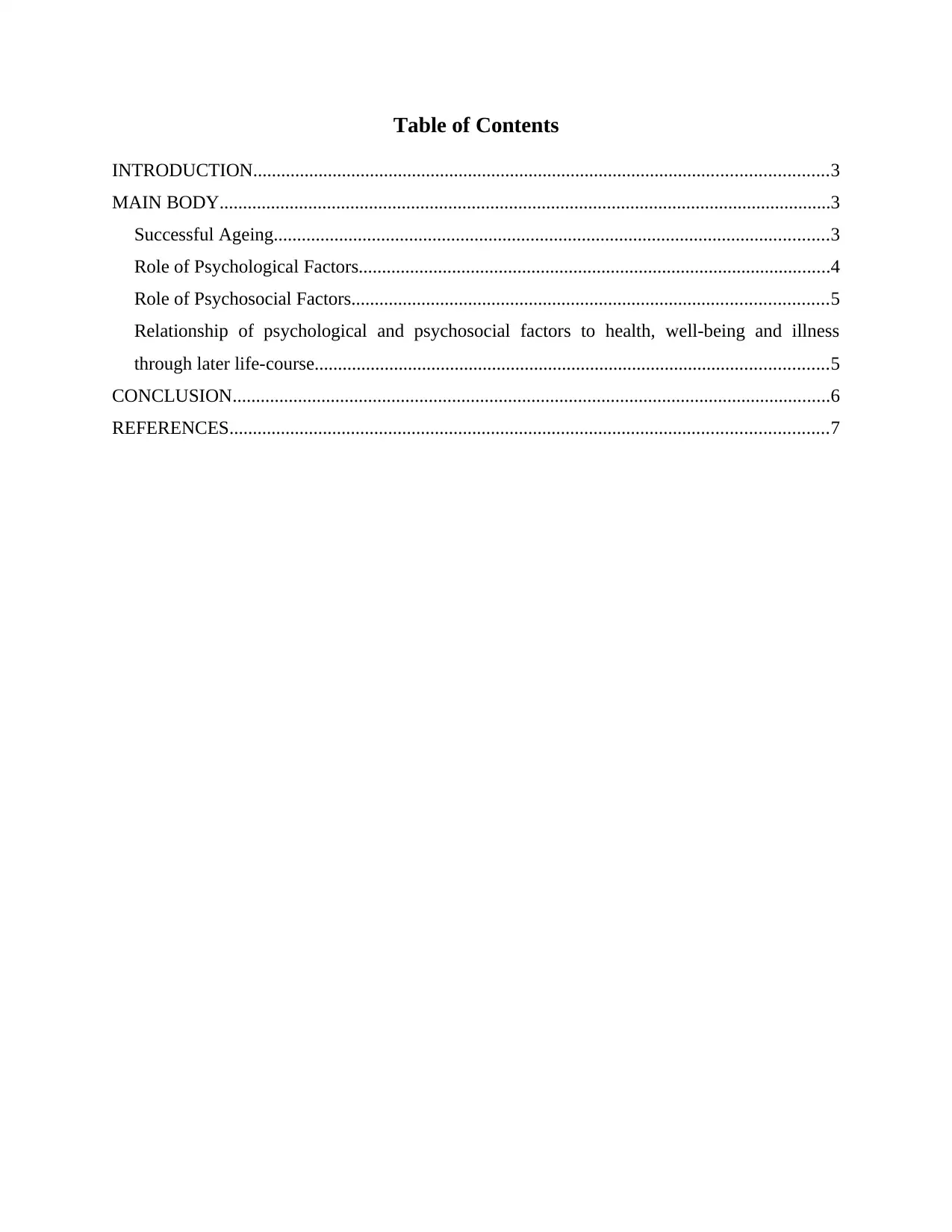
Table of Contents
INTRODUCTION...........................................................................................................................3
MAIN BODY...................................................................................................................................3
Successful Ageing.......................................................................................................................3
Role of Psychological Factors.....................................................................................................4
Role of Psychosocial Factors......................................................................................................5
Relationship of psychological and psychosocial factors to health, well-being and illness
through later life-course..............................................................................................................5
CONCLUSION................................................................................................................................6
REFERENCES................................................................................................................................7
INTRODUCTION...........................................................................................................................3
MAIN BODY...................................................................................................................................3
Successful Ageing.......................................................................................................................3
Role of Psychological Factors.....................................................................................................4
Role of Psychosocial Factors......................................................................................................5
Relationship of psychological and psychosocial factors to health, well-being and illness
through later life-course..............................................................................................................5
CONCLUSION................................................................................................................................6
REFERENCES................................................................................................................................7
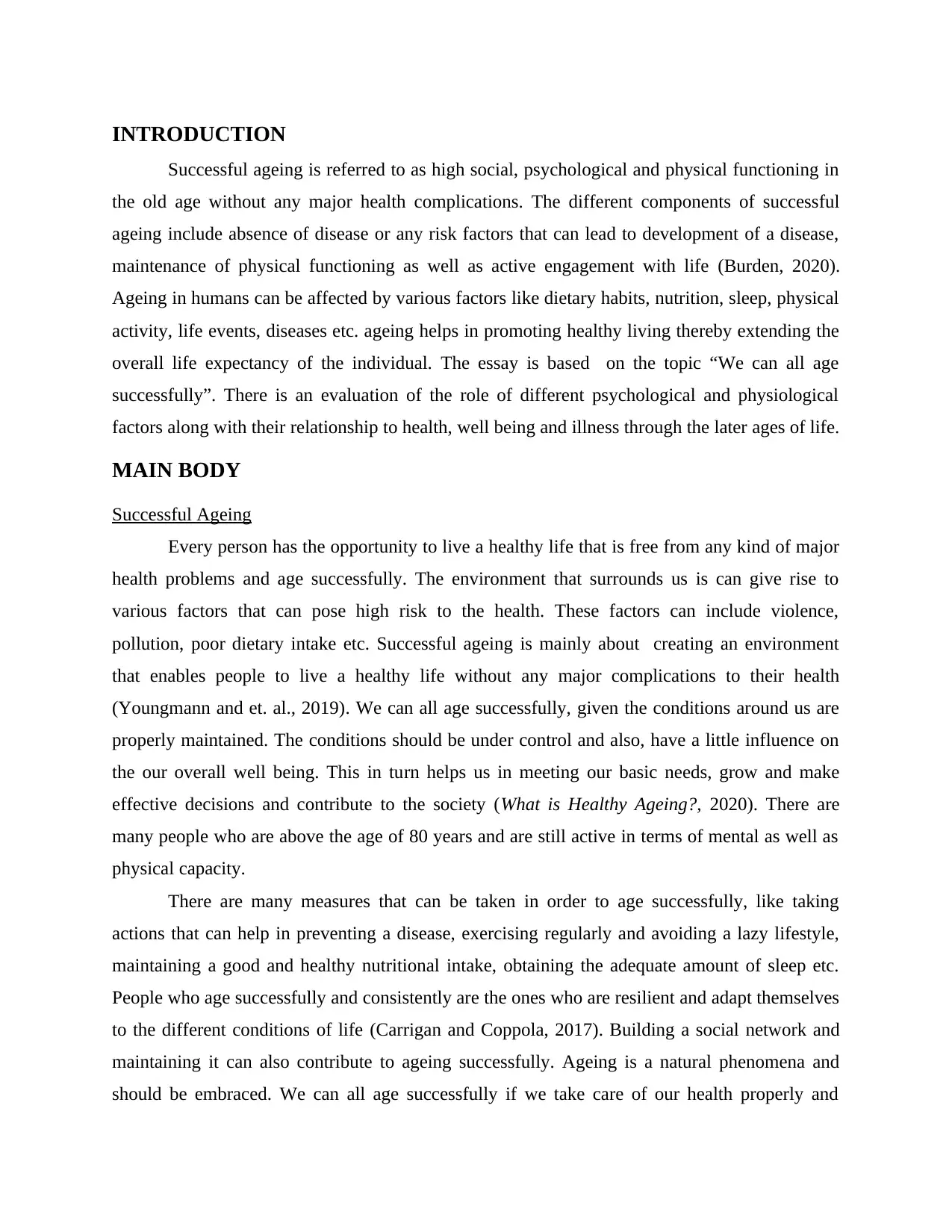
INTRODUCTION
Successful ageing is referred to as high social, psychological and physical functioning in
the old age without any major health complications. The different components of successful
ageing include absence of disease or any risk factors that can lead to development of a disease,
maintenance of physical functioning as well as active engagement with life (Burden, 2020).
Ageing in humans can be affected by various factors like dietary habits, nutrition, sleep, physical
activity, life events, diseases etc. ageing helps in promoting healthy living thereby extending the
overall life expectancy of the individual. The essay is based on the topic “We can all age
successfully”. There is an evaluation of the role of different psychological and physiological
factors along with their relationship to health, well being and illness through the later ages of life.
MAIN BODY
Successful Ageing
Every person has the opportunity to live a healthy life that is free from any kind of major
health problems and age successfully. The environment that surrounds us is can give rise to
various factors that can pose high risk to the health. These factors can include violence,
pollution, poor dietary intake etc. Successful ageing is mainly about creating an environment
that enables people to live a healthy life without any major complications to their health
(Youngmann and et. al., 2019). We can all age successfully, given the conditions around us are
properly maintained. The conditions should be under control and also, have a little influence on
the our overall well being. This in turn helps us in meeting our basic needs, grow and make
effective decisions and contribute to the society (What is Healthy Ageing?, 2020). There are
many people who are above the age of 80 years and are still active in terms of mental as well as
physical capacity.
There are many measures that can be taken in order to age successfully, like taking
actions that can help in preventing a disease, exercising regularly and avoiding a lazy lifestyle,
maintaining a good and healthy nutritional intake, obtaining the adequate amount of sleep etc.
People who age successfully and consistently are the ones who are resilient and adapt themselves
to the different conditions of life (Carrigan and Coppola, 2017). Building a social network and
maintaining it can also contribute to ageing successfully. Ageing is a natural phenomena and
should be embraced. We can all age successfully if we take care of our health properly and
Successful ageing is referred to as high social, psychological and physical functioning in
the old age without any major health complications. The different components of successful
ageing include absence of disease or any risk factors that can lead to development of a disease,
maintenance of physical functioning as well as active engagement with life (Burden, 2020).
Ageing in humans can be affected by various factors like dietary habits, nutrition, sleep, physical
activity, life events, diseases etc. ageing helps in promoting healthy living thereby extending the
overall life expectancy of the individual. The essay is based on the topic “We can all age
successfully”. There is an evaluation of the role of different psychological and physiological
factors along with their relationship to health, well being and illness through the later ages of life.
MAIN BODY
Successful Ageing
Every person has the opportunity to live a healthy life that is free from any kind of major
health problems and age successfully. The environment that surrounds us is can give rise to
various factors that can pose high risk to the health. These factors can include violence,
pollution, poor dietary intake etc. Successful ageing is mainly about creating an environment
that enables people to live a healthy life without any major complications to their health
(Youngmann and et. al., 2019). We can all age successfully, given the conditions around us are
properly maintained. The conditions should be under control and also, have a little influence on
the our overall well being. This in turn helps us in meeting our basic needs, grow and make
effective decisions and contribute to the society (What is Healthy Ageing?, 2020). There are
many people who are above the age of 80 years and are still active in terms of mental as well as
physical capacity.
There are many measures that can be taken in order to age successfully, like taking
actions that can help in preventing a disease, exercising regularly and avoiding a lazy lifestyle,
maintaining a good and healthy nutritional intake, obtaining the adequate amount of sleep etc.
People who age successfully and consistently are the ones who are resilient and adapt themselves
to the different conditions of life (Carrigan and Coppola, 2017). Building a social network and
maintaining it can also contribute to ageing successfully. Ageing is a natural phenomena and
should be embraced. We can all age successfully if we take care of our health properly and
⊘ This is a preview!⊘
Do you want full access?
Subscribe today to unlock all pages.

Trusted by 1+ million students worldwide
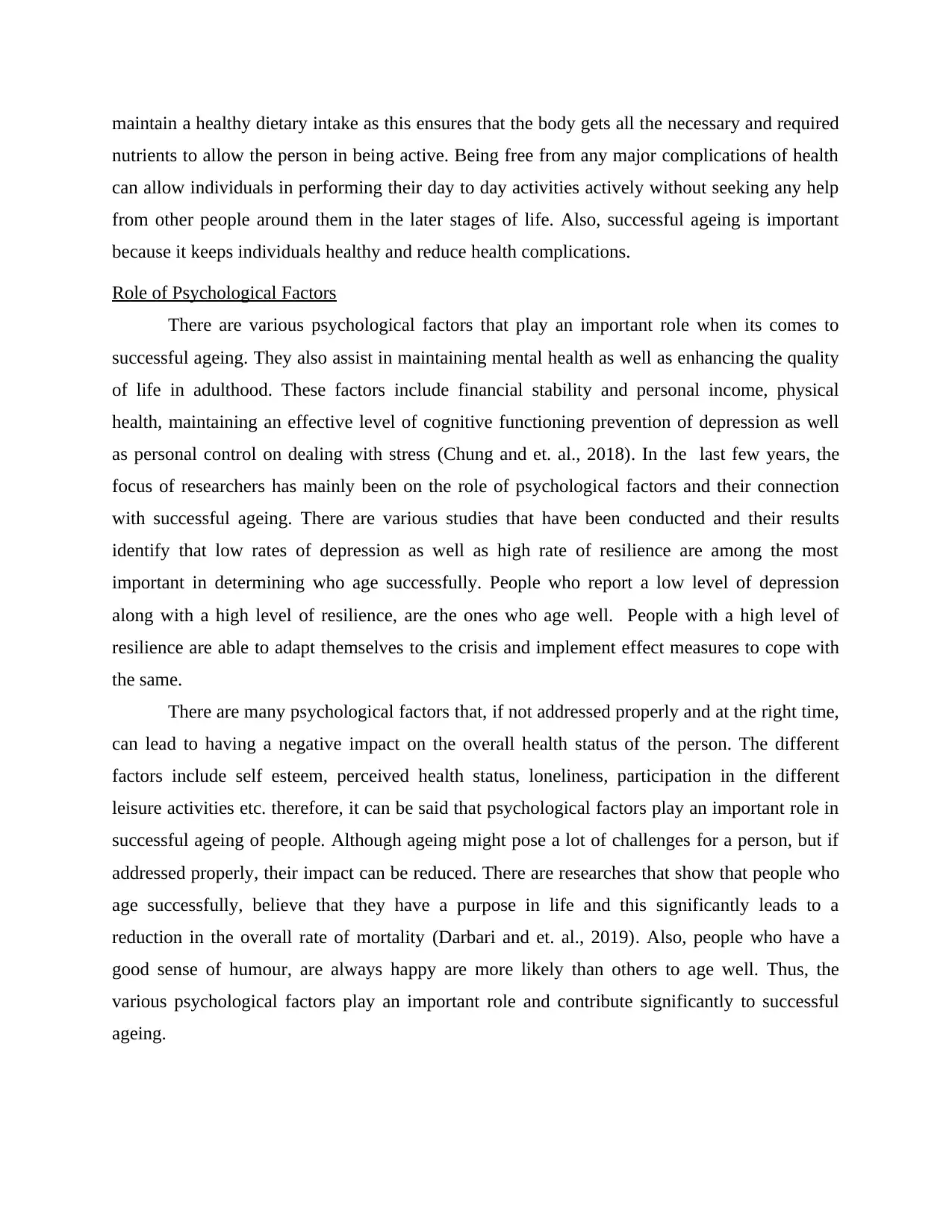
maintain a healthy dietary intake as this ensures that the body gets all the necessary and required
nutrients to allow the person in being active. Being free from any major complications of health
can allow individuals in performing their day to day activities actively without seeking any help
from other people around them in the later stages of life. Also, successful ageing is important
because it keeps individuals healthy and reduce health complications.
Role of Psychological Factors
There are various psychological factors that play an important role when its comes to
successful ageing. They also assist in maintaining mental health as well as enhancing the quality
of life in adulthood. These factors include financial stability and personal income, physical
health, maintaining an effective level of cognitive functioning prevention of depression as well
as personal control on dealing with stress (Chung and et. al., 2018). In the last few years, the
focus of researchers has mainly been on the role of psychological factors and their connection
with successful ageing. There are various studies that have been conducted and their results
identify that low rates of depression as well as high rate of resilience are among the most
important in determining who age successfully. People who report a low level of depression
along with a high level of resilience, are the ones who age well. People with a high level of
resilience are able to adapt themselves to the crisis and implement effect measures to cope with
the same.
There are many psychological factors that, if not addressed properly and at the right time,
can lead to having a negative impact on the overall health status of the person. The different
factors include self esteem, perceived health status, loneliness, participation in the different
leisure activities etc. therefore, it can be said that psychological factors play an important role in
successful ageing of people. Although ageing might pose a lot of challenges for a person, but if
addressed properly, their impact can be reduced. There are researches that show that people who
age successfully, believe that they have a purpose in life and this significantly leads to a
reduction in the overall rate of mortality (Darbari and et. al., 2019). Also, people who have a
good sense of humour, are always happy are more likely than others to age well. Thus, the
various psychological factors play an important role and contribute significantly to successful
ageing.
nutrients to allow the person in being active. Being free from any major complications of health
can allow individuals in performing their day to day activities actively without seeking any help
from other people around them in the later stages of life. Also, successful ageing is important
because it keeps individuals healthy and reduce health complications.
Role of Psychological Factors
There are various psychological factors that play an important role when its comes to
successful ageing. They also assist in maintaining mental health as well as enhancing the quality
of life in adulthood. These factors include financial stability and personal income, physical
health, maintaining an effective level of cognitive functioning prevention of depression as well
as personal control on dealing with stress (Chung and et. al., 2018). In the last few years, the
focus of researchers has mainly been on the role of psychological factors and their connection
with successful ageing. There are various studies that have been conducted and their results
identify that low rates of depression as well as high rate of resilience are among the most
important in determining who age successfully. People who report a low level of depression
along with a high level of resilience, are the ones who age well. People with a high level of
resilience are able to adapt themselves to the crisis and implement effect measures to cope with
the same.
There are many psychological factors that, if not addressed properly and at the right time,
can lead to having a negative impact on the overall health status of the person. The different
factors include self esteem, perceived health status, loneliness, participation in the different
leisure activities etc. therefore, it can be said that psychological factors play an important role in
successful ageing of people. Although ageing might pose a lot of challenges for a person, but if
addressed properly, their impact can be reduced. There are researches that show that people who
age successfully, believe that they have a purpose in life and this significantly leads to a
reduction in the overall rate of mortality (Darbari and et. al., 2019). Also, people who have a
good sense of humour, are always happy are more likely than others to age well. Thus, the
various psychological factors play an important role and contribute significantly to successful
ageing.
Paraphrase This Document
Need a fresh take? Get an instant paraphrase of this document with our AI Paraphraser
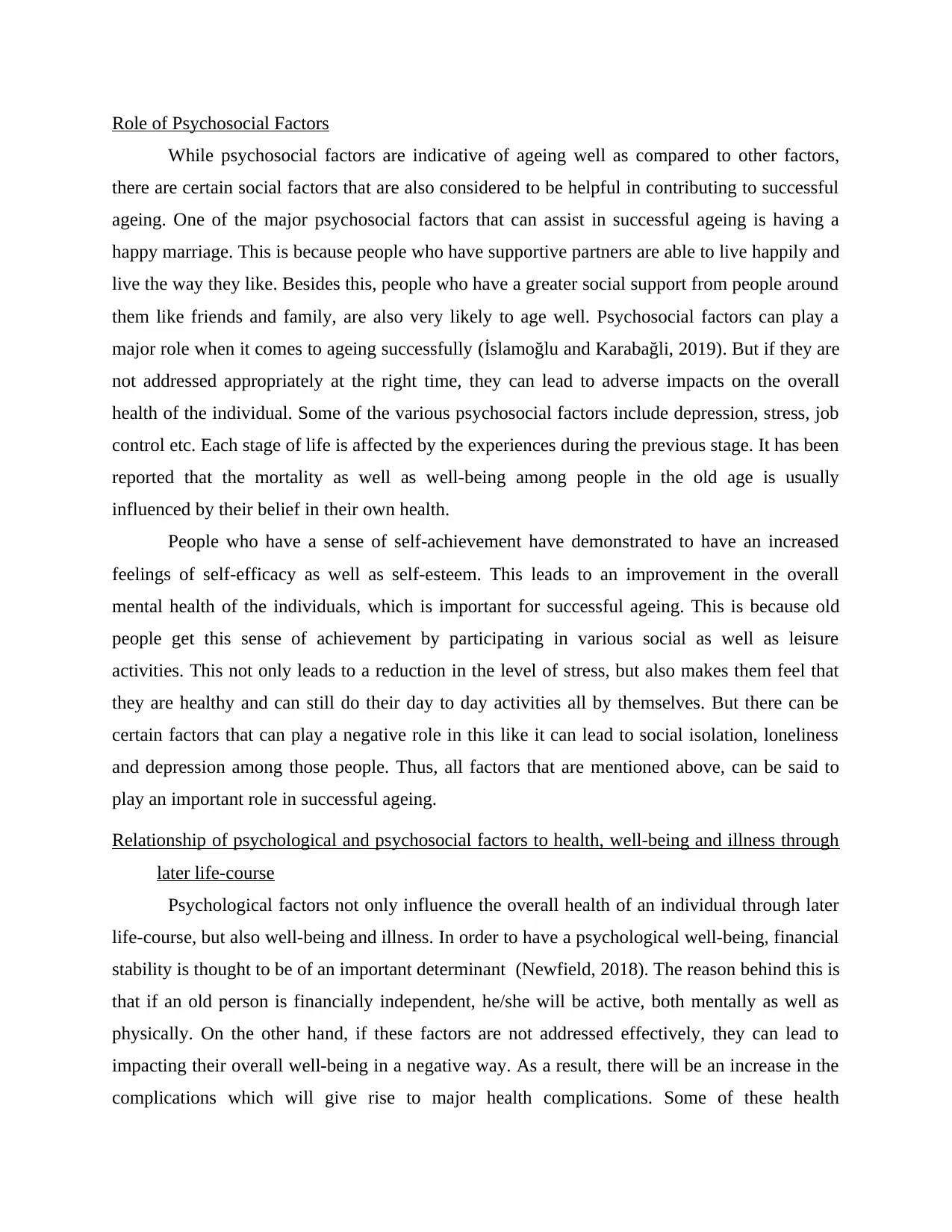
Role of Psychosocial Factors
While psychosocial factors are indicative of ageing well as compared to other factors,
there are certain social factors that are also considered to be helpful in contributing to successful
ageing. One of the major psychosocial factors that can assist in successful ageing is having a
happy marriage. This is because people who have supportive partners are able to live happily and
live the way they like. Besides this, people who have a greater social support from people around
them like friends and family, are also very likely to age well. Psychosocial factors can play a
major role when it comes to ageing successfully (İslamoğlu and Karabağli, 2019). But if they are
not addressed appropriately at the right time, they can lead to adverse impacts on the overall
health of the individual. Some of the various psychosocial factors include depression, stress, job
control etc. Each stage of life is affected by the experiences during the previous stage. It has been
reported that the mortality as well as well-being among people in the old age is usually
influenced by their belief in their own health.
People who have a sense of self-achievement have demonstrated to have an increased
feelings of self-efficacy as well as self-esteem. This leads to an improvement in the overall
mental health of the individuals, which is important for successful ageing. This is because old
people get this sense of achievement by participating in various social as well as leisure
activities. This not only leads to a reduction in the level of stress, but also makes them feel that
they are healthy and can still do their day to day activities all by themselves. But there can be
certain factors that can play a negative role in this like it can lead to social isolation, loneliness
and depression among those people. Thus, all factors that are mentioned above, can be said to
play an important role in successful ageing.
Relationship of psychological and psychosocial factors to health, well-being and illness through
later life-course
Psychological factors not only influence the overall health of an individual through later
life-course, but also well-being and illness. In order to have a psychological well-being, financial
stability is thought to be of an important determinant (Newfield, 2018). The reason behind this is
that if an old person is financially independent, he/she will be active, both mentally as well as
physically. On the other hand, if these factors are not addressed effectively, they can lead to
impacting their overall well-being in a negative way. As a result, there will be an increase in the
complications which will give rise to major health complications. Some of these health
While psychosocial factors are indicative of ageing well as compared to other factors,
there are certain social factors that are also considered to be helpful in contributing to successful
ageing. One of the major psychosocial factors that can assist in successful ageing is having a
happy marriage. This is because people who have supportive partners are able to live happily and
live the way they like. Besides this, people who have a greater social support from people around
them like friends and family, are also very likely to age well. Psychosocial factors can play a
major role when it comes to ageing successfully (İslamoğlu and Karabağli, 2019). But if they are
not addressed appropriately at the right time, they can lead to adverse impacts on the overall
health of the individual. Some of the various psychosocial factors include depression, stress, job
control etc. Each stage of life is affected by the experiences during the previous stage. It has been
reported that the mortality as well as well-being among people in the old age is usually
influenced by their belief in their own health.
People who have a sense of self-achievement have demonstrated to have an increased
feelings of self-efficacy as well as self-esteem. This leads to an improvement in the overall
mental health of the individuals, which is important for successful ageing. This is because old
people get this sense of achievement by participating in various social as well as leisure
activities. This not only leads to a reduction in the level of stress, but also makes them feel that
they are healthy and can still do their day to day activities all by themselves. But there can be
certain factors that can play a negative role in this like it can lead to social isolation, loneliness
and depression among those people. Thus, all factors that are mentioned above, can be said to
play an important role in successful ageing.
Relationship of psychological and psychosocial factors to health, well-being and illness through
later life-course
Psychological factors not only influence the overall health of an individual through later
life-course, but also well-being and illness. In order to have a psychological well-being, financial
stability is thought to be of an important determinant (Newfield, 2018). The reason behind this is
that if an old person is financially independent, he/she will be active, both mentally as well as
physically. On the other hand, if these factors are not addressed effectively, they can lead to
impacting their overall well-being in a negative way. As a result, there will be an increase in the
complications which will give rise to major health complications. Some of these health
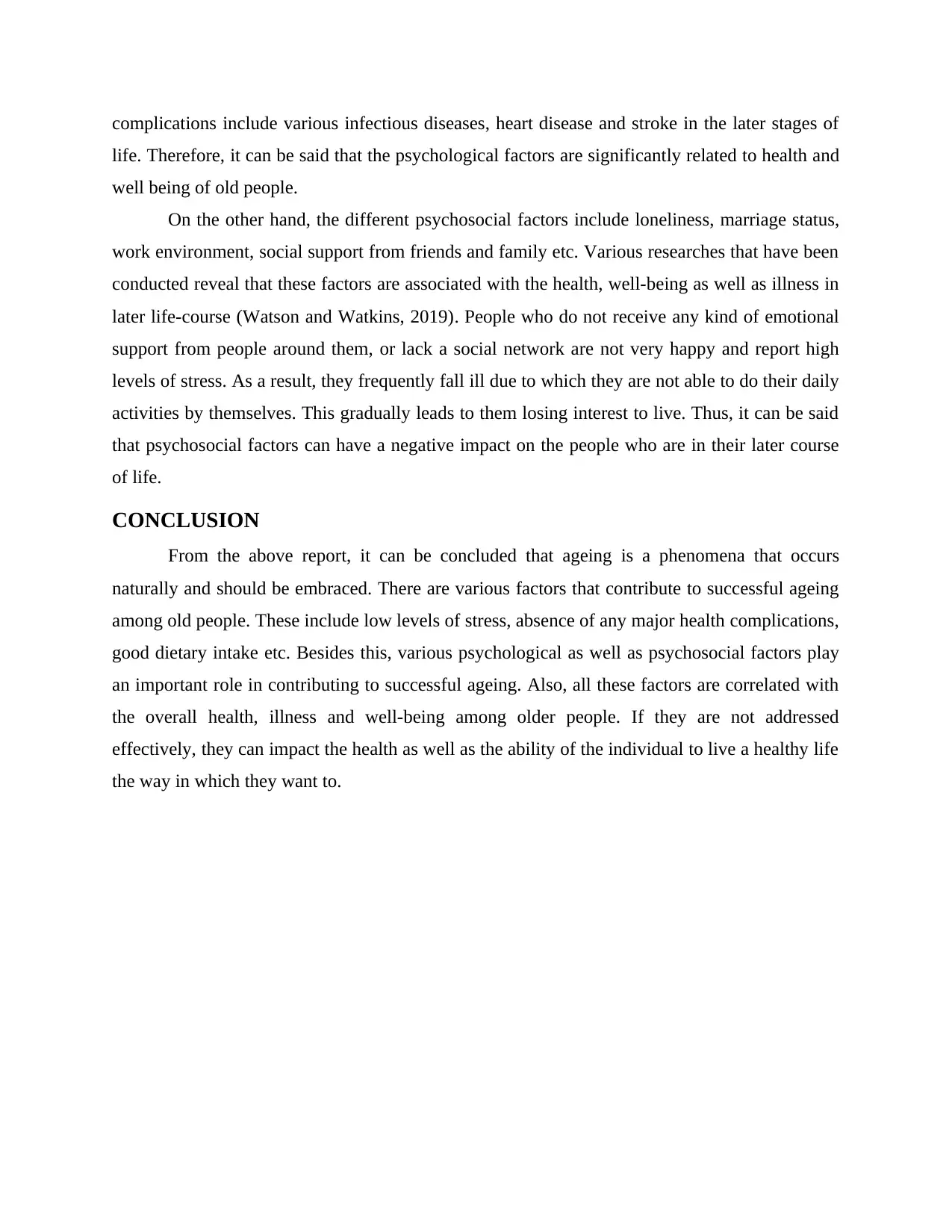
complications include various infectious diseases, heart disease and stroke in the later stages of
life. Therefore, it can be said that the psychological factors are significantly related to health and
well being of old people.
On the other hand, the different psychosocial factors include loneliness, marriage status,
work environment, social support from friends and family etc. Various researches that have been
conducted reveal that these factors are associated with the health, well-being as well as illness in
later life-course (Watson and Watkins, 2019). People who do not receive any kind of emotional
support from people around them, or lack a social network are not very happy and report high
levels of stress. As a result, they frequently fall ill due to which they are not able to do their daily
activities by themselves. This gradually leads to them losing interest to live. Thus, it can be said
that psychosocial factors can have a negative impact on the people who are in their later course
of life.
CONCLUSION
From the above report, it can be concluded that ageing is a phenomena that occurs
naturally and should be embraced. There are various factors that contribute to successful ageing
among old people. These include low levels of stress, absence of any major health complications,
good dietary intake etc. Besides this, various psychological as well as psychosocial factors play
an important role in contributing to successful ageing. Also, all these factors are correlated with
the overall health, illness and well-being among older people. If they are not addressed
effectively, they can impact the health as well as the ability of the individual to live a healthy life
the way in which they want to.
life. Therefore, it can be said that the psychological factors are significantly related to health and
well being of old people.
On the other hand, the different psychosocial factors include loneliness, marriage status,
work environment, social support from friends and family etc. Various researches that have been
conducted reveal that these factors are associated with the health, well-being as well as illness in
later life-course (Watson and Watkins, 2019). People who do not receive any kind of emotional
support from people around them, or lack a social network are not very happy and report high
levels of stress. As a result, they frequently fall ill due to which they are not able to do their daily
activities by themselves. This gradually leads to them losing interest to live. Thus, it can be said
that psychosocial factors can have a negative impact on the people who are in their later course
of life.
CONCLUSION
From the above report, it can be concluded that ageing is a phenomena that occurs
naturally and should be embraced. There are various factors that contribute to successful ageing
among old people. These include low levels of stress, absence of any major health complications,
good dietary intake etc. Besides this, various psychological as well as psychosocial factors play
an important role in contributing to successful ageing. Also, all these factors are correlated with
the overall health, illness and well-being among older people. If they are not addressed
effectively, they can impact the health as well as the ability of the individual to live a healthy life
the way in which they want to.
⊘ This is a preview!⊘
Do you want full access?
Subscribe today to unlock all pages.

Trusted by 1+ million students worldwide
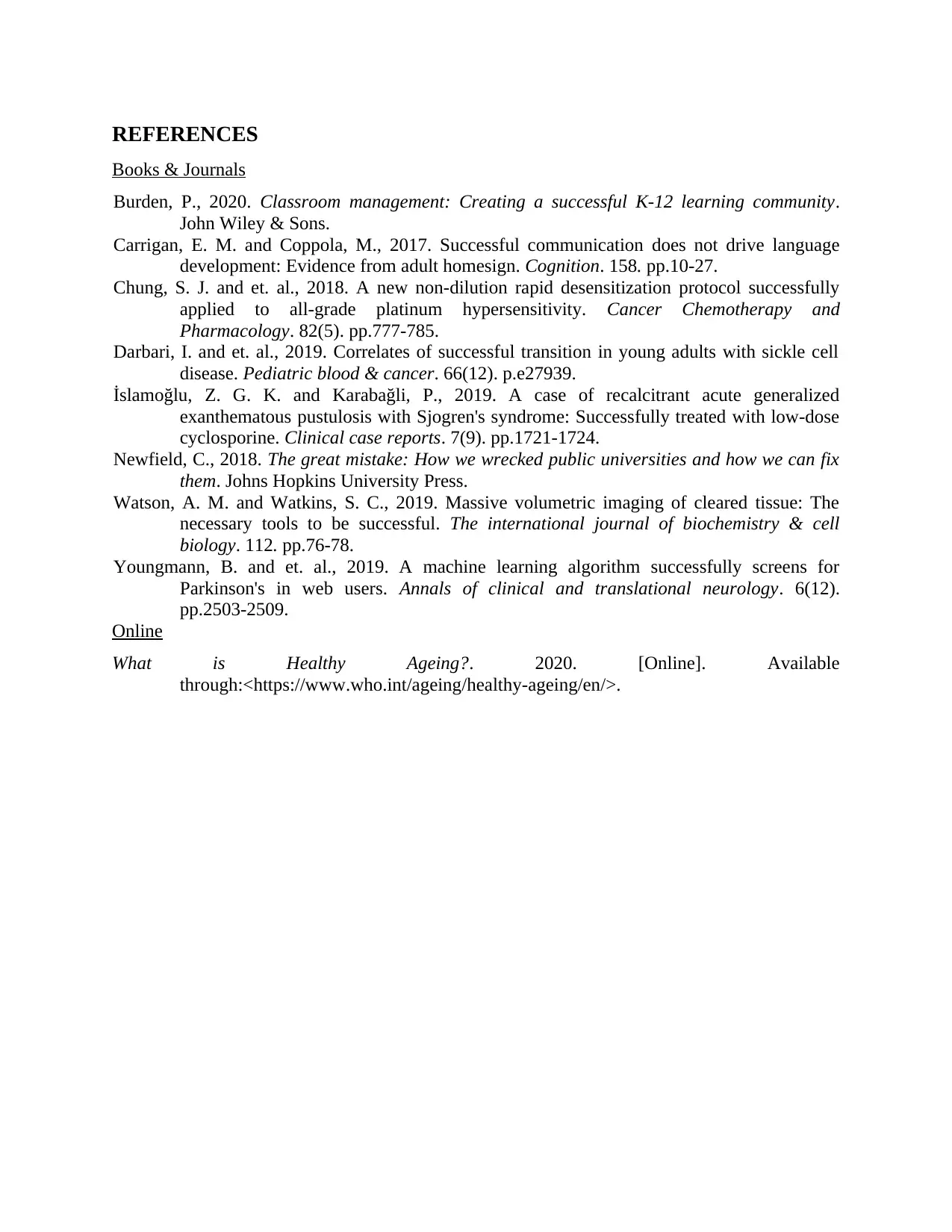
REFERENCES
Books & Journals
Burden, P., 2020. Classroom management: Creating a successful K-12 learning community.
John Wiley & Sons.
Carrigan, E. M. and Coppola, M., 2017. Successful communication does not drive language
development: Evidence from adult homesign. Cognition. 158. pp.10-27.
Chung, S. J. and et. al., 2018. A new non-dilution rapid desensitization protocol successfully
applied to all-grade platinum hypersensitivity. Cancer Chemotherapy and
Pharmacology. 82(5). pp.777-785.
Darbari, I. and et. al., 2019. Correlates of successful transition in young adults with sickle cell
disease. Pediatric blood & cancer. 66(12). p.e27939.
İslamoğlu, Z. G. K. and Karabağli, P., 2019. A case of recalcitrant acute generalized
exanthematous pustulosis with Sjogren's syndrome: Successfully treated with low‐dose
cyclosporine. Clinical case reports. 7(9). pp.1721-1724.
Newfield, C., 2018. The great mistake: How we wrecked public universities and how we can fix
them. Johns Hopkins University Press.
Watson, A. M. and Watkins, S. C., 2019. Massive volumetric imaging of cleared tissue: The
necessary tools to be successful. The international journal of biochemistry & cell
biology. 112. pp.76-78.
Youngmann, B. and et. al., 2019. A machine learning algorithm successfully screens for
Parkinson's in web users. Annals of clinical and translational neurology. 6(12).
pp.2503-2509.
Online
What is Healthy Ageing?. 2020. [Online]. Available
through:<https://www.who.int/ageing/healthy-ageing/en/>.
Books & Journals
Burden, P., 2020. Classroom management: Creating a successful K-12 learning community.
John Wiley & Sons.
Carrigan, E. M. and Coppola, M., 2017. Successful communication does not drive language
development: Evidence from adult homesign. Cognition. 158. pp.10-27.
Chung, S. J. and et. al., 2018. A new non-dilution rapid desensitization protocol successfully
applied to all-grade platinum hypersensitivity. Cancer Chemotherapy and
Pharmacology. 82(5). pp.777-785.
Darbari, I. and et. al., 2019. Correlates of successful transition in young adults with sickle cell
disease. Pediatric blood & cancer. 66(12). p.e27939.
İslamoğlu, Z. G. K. and Karabağli, P., 2019. A case of recalcitrant acute generalized
exanthematous pustulosis with Sjogren's syndrome: Successfully treated with low‐dose
cyclosporine. Clinical case reports. 7(9). pp.1721-1724.
Newfield, C., 2018. The great mistake: How we wrecked public universities and how we can fix
them. Johns Hopkins University Press.
Watson, A. M. and Watkins, S. C., 2019. Massive volumetric imaging of cleared tissue: The
necessary tools to be successful. The international journal of biochemistry & cell
biology. 112. pp.76-78.
Youngmann, B. and et. al., 2019. A machine learning algorithm successfully screens for
Parkinson's in web users. Annals of clinical and translational neurology. 6(12).
pp.2503-2509.
Online
What is Healthy Ageing?. 2020. [Online]. Available
through:<https://www.who.int/ageing/healthy-ageing/en/>.
1 out of 7
Related Documents
Your All-in-One AI-Powered Toolkit for Academic Success.
+13062052269
info@desklib.com
Available 24*7 on WhatsApp / Email
![[object Object]](/_next/static/media/star-bottom.7253800d.svg)
Unlock your academic potential
Copyright © 2020–2025 A2Z Services. All Rights Reserved. Developed and managed by ZUCOL.





